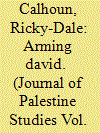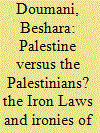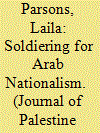| Srl | Item |
| 1 |
ID:
080034


|
|
|
|
|
| Publication |
2007.
|
| Summary/Abstract |
Anticipating an armed conflict in Palestine after World War II, the Haganah embarked upon a large-scale effort to buy armaments to be sent to Palestine. Through front companies, and with the cooperation of certain Latin American governments, arms purchased primarily through the War Assets Administration, which sold surplus U.S. military equipment in the wake of World War II, were transferred illegally to Palestine, often via Czechoslovakia. This article places a group of prominent, wealthy, and politically connected Jewish Americans-referred to here as the Sonneborn group, a reference to the involvement of Rudolf Sonneborn-at the center of a network of Haganah operatives involved in this effort.
|
|
|
|
|
|
|
|
|
|
|
|
|
|
|
|
| 2 |
ID:
080036


|
|
|
|
|
| Publication |
2007.
|
| Summary/Abstract |
An iron law of the conflict over Palestine has been the refusal by the Zionist movement and its backers, first Great Britain and then the United States, to make room for the existence of Palestinians as a political community. This non-recognition is rooted in historical forces that predate the existence of the Zionist movement and the Palestinians as a people. Consequently, there is a tension between identity and territory, with obvious repercussions for the following questions: Who are the Palestinians? What do they want? And who speaks for them? This essay calls for a critical reappraisal of the relationship between the concepts "Palestine" and "Palestinians," as well as of the state-centered project of successive phases of the Palestinian national movement.
|
|
|
|
|
|
|
|
|
|
|
|
|
|
|
|
| 3 |
ID:
080035


|
|
|
|
|
| Publication |
2007.
|
| Summary/Abstract |
Fawzi al-Qawuqji was a soldier and Arab nationalist who fought European colonialism all over the Middle East between World War I and 1948. He served as an officer in the 4th Brigade of the Ottoman Army, fighting the British advance north through Palestine; led the al-Hama sector of the Syrian Revolt against the French in 1925-1927; was one of the rebel leaders in the Arab revolt against the British in Palestine in 1936; participated in the Rashid 'Ali al-Kaylani coup against the British-controlled government in Iraq in 1941; and served as field commander of the Arab Liberation Army in the 1948 Arab-Israeli war. This essay, part of a larger study of Qawuqji's life and career, is based on his published memoirs as well as his private papers, stored in boxes at the back of a closet in the Beirut apartment where he lived after his retirement until his death in 1976
|
|
|
|
|
|
|
|
|
|
|
|
|
|
|
|
| 4 |
ID:
080033


|
|
|
|
|
| Publication |
2007.
|
| Summary/Abstract |
Drawing on Max Weber's three kinds of legitimate domination, this article proposes the concept of "post-charisma transition" to describe the transformation of a political system in which authority is legitimated by a leader's personal stature. As illustrated by recent Palestinian politics, such a transition may result in attempts at institution-building when a successor to a charismatic leader bolsters legal forms in order to derive authority that his personality alone cannot command. Whereas charisma was an important facet of Yasir Arafat's rule, Mahmud Abbas's lack of charisma has rendered him unable to govern the system that Arafat bequeathed him. Analysis of Abbas's dilemma sheds new light on the legislative elections of 2006 and subsequent events, including the latest developments in the Gaza Strip
|
|
|
|
|
|
|
|
|
|
|
|
|
|
|
|